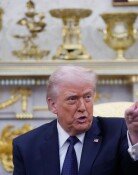Do Korea and the U.S. Share Interests Besides the Nuclear Issue?
Do Korea and the U.S. Share Interests Besides the Nuclear Issue?
Posted March. 28, 2007 07:34,
Participants in an international conference held a discussion on North Koreas nuclear issue in the morning and talked about Korea-U.S. relations and issues surrounding the Korean peninsula in the afternoon.
Yonsei University professor Kim Dal-joong led the second session on the tensions in Korea-U.S. relations.
The Korea-U.S. alliance seems to be facing a crisis in recent years, but it is not as bad as it seems. The two countries are negotiating an FTA which the U.S and Japan are not even discussing, said Michael Green, senior advisor at the Center for Strategic and International Studies (CSIS).
Differences in doctrine and world view caused ruptures in the relationship. When the U.S. talked of human rights issues, Korea feared a regime change in the North, and when Korea talked of reconciliation between the two Koreas, the U.S. misunderstood it as siding with a rogue state, Michael explained.
He also pointed out that domestic political controversy in the two countries disrupted problem solving efforts.
The CSIS senior advisor said that the Democrats pressured the Bush administration to engage in more negotiations with the North, and that the progressives in Korea argued that the conservatives were exaggerating the North Korean threat and were suppressing basic freedoms.
Leaders of the two countries should firmly establish a vision for the alliance and set specific military goals. In particular, they should be extremely careful in describing the other country, Michael pointed out.
It is unclear what mutual interests are shared between the two countries other than resolving the North Korean nuclear issue. The two sides should make clear the political and economic benefits to be gained from the Norths abandonment of its nuclear weapons, but they should not damage the principle of mutuality, stressed Sungkyunkwan University professor Kim Tae-hyo.
On the surface, it seems as if the two countries are getting closer, but we all know what is really happening, said professor Don Oberdorfer, adjunct professor of International Relations at Johns Hopkins University.
Korean society is confused over the transfer of operational control and dismantlement of the Combined Forces Command. They are concerned that security cooperation could be undermined. Also, they are curious about how the U.S. will respond if the North demands the dismantlement of U.N. Forces Command, said former Deputy Minister of National Defense Park Yeong-ok.
After North Koreas nuclear tests, Korea cannot practice deterrence against the North by itself. Unless Korea develops nuclear weapons, it has no choice but to depend on defense treaties such as the nuclear umbrella of the U.S., he added.
srkim@donga.com sechepa@donga.com







